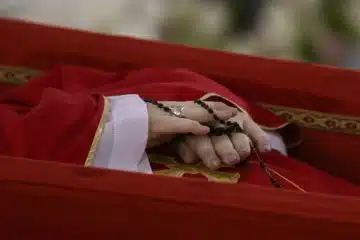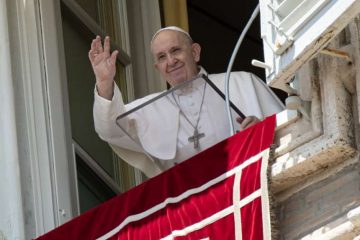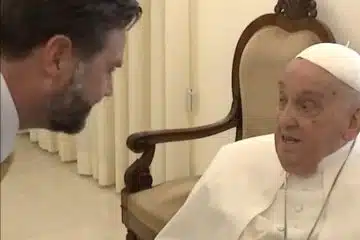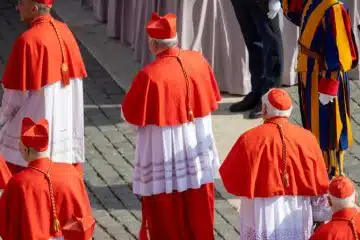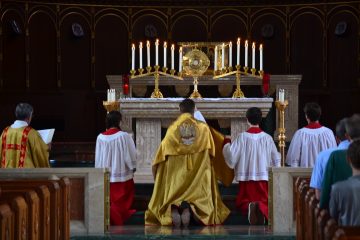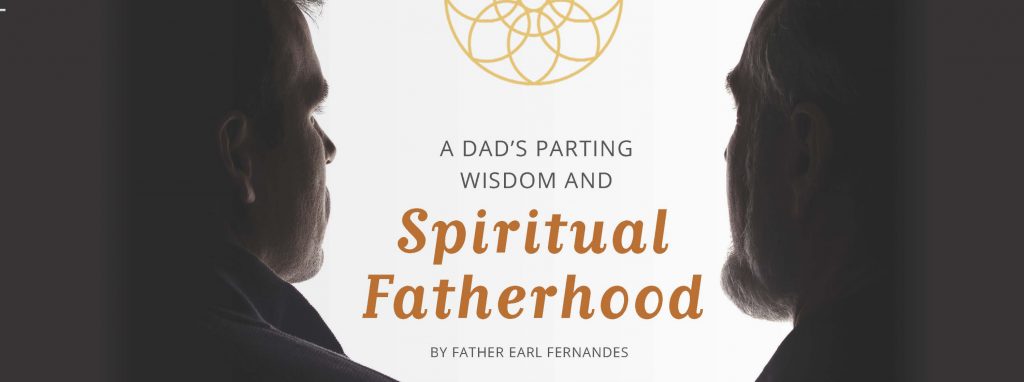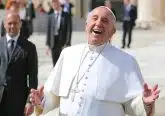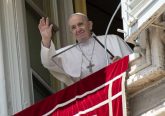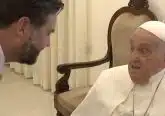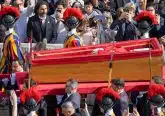A Dad’s Parting Wisdom and Spiritual Fatherhood
In his Apostolic Letter Patris Corde, Pope Francis describes St. Joseph as a beloved father; a tender and loving father; an obedient and accepting father; a working father who was creatively courageous; and, finally, as the “shadow of the Father,” reflecting the Eternal Fatherhood of God.
Priests are also called “Father.” Most of what I know about fatherhood, I learned from my own father. He spent long hours as a doctor at the hospital to put food on the table, and he spent his free time teaching us about the faith.
My father had a profound respect for human life and cherished us, and later, his grandchildren, always encouraging us to do our best. He also prayed, not only at home during our family Rosary, but also at the hospital for his patients. He taught me to desire to be a father, and as a priest, to exercise spiritual fatherhood.
THE SACRIFICE OF CALVARY
Shortly before his death in July 2019, I had my last substantive conversation with my father. I asked him, “Is there anything else you’d like to teach your grandchildren?” His answer led me to reflect more deeply on the vocation of a priest as a spiritual father. He said, “Yes. First, tell my grandchildren to pray every day, but prayer alone is not enough. They need the fruits of the sacrifice of Calvary. Tell them to go to Mass.”
As spiritual fathers, priests are called to lead the Family of God in prayer. Like other fathers, priests do work on behalf of others in the liturgy. Priests offer the sacrifice of Calvary at each Mass; they feed God’s family with the Bread of Life.
STRIVE FOR HEAVEN
“Second,” my dad said, “tell them to strive for greatness. God did not make them for mediocrity. They must strive for heaven, not purgatory. Greatness is measured in faithfulness to God.”
Pope Francis wants a synodal Church that walks together. The priest, as spiritual father, must lead the People of God on their pilgrimage to heaven. He cannot allow anyone of His children to lag too far behind or to settle for less.
As a spiritual father, the priest must offer encouragement to the flock to bring out the best in them. He animates their vocation, their gifts and talents. How many priests unfortunately go through the motions in the celebration of Mass, in their preaching, and in their study? Everything can become routine and functional, but true fathers, with love for their children, never allow this to happen. True love for the flock opens them to hope which lies in the potential of their children.
PROTECT LIFE
My father added, “Third, remind them to protect, defend, cherish and nurture human life.” This was not surprising to me as my father spent his life saving lives. He defended the unborn, the disabled and the elderly. He accompanied the sick back to health and comforted the dying and their families. To be a father, it is not enough to have children and generate life, one must nurture and educate that life. Certainly, Pope Francis calls the whole Church, but especially priests, to resist the throwaway culture which values people for what they do and have rather than for who they are. The priest accompanies God’s people.
Priests must lead the defense of life. It is not enough to baptize children; rather, the gift of faith must be nurtured through catechesis and formation and by offering support and encouragement to parents. As a spiritual father, the priest realizes that he is at the service of life.
BE WHO YOU ARE
Never short for words, my father continued, “Tell my grandchildren to be humble. There will always be someone faster, stronger, smarter or more handsome, but recall what St. Francis de Sales said, ‘Be who you are and be that well in honor of the Master Craftsman whose handiwork you are.’”
As spiritual father, configured to Christ, the priest must follow the example of Jesus who humbled Himself to become man, born in utter poverty in a stable; who associated Himself with the poor and lowly; who washed the feet of His disciples; and, who humbled Himself, becoming obedient unto death.
BUILD OTHERS UP
He concluded by saying, “Finally, tell them never to humiliate another person.” He recounted a story which he had never previously told me of how he was sent by his mother with special biscuits to a wealthy relative’s home on Christmas. Being poor, they did not have much to offer, but my grandmother wanted to give something. When my father knocked at the door, the woman took the biscuits and threw them on the floor for the dogs to eat. My father said, “She did that to humiliate us because we were poor. Never let my grandchildren humiliate another person.”
As spiritual fathers, priests are called to be like St. Barnabas, a “son of encouragement,” building people up, especially the poor. The priest must be equally accessible to the poor and rich alike. St. Luke’s Gospel demonstrates the preferential option Jesus had for the poor. The bottom line: Treat others with respect. Every father must acknowledge the dignity of his child.
I learned a lot about fatherhood from my own father. During this Year of St. Joseph, I am learning from St. Joseph about priesthood and fatherhood. The Holy Father writes: “In every exercise of our fatherhood, we should always keep in mind that it has nothing to do with possession, but is rather a sign pointing to a greater fatherhood. In a way, we are all like Joseph: a shadow of the heavenly Father, who ‘makes his sun rise on the evil and on the good, and sends rain on the just and the unjust’ (Mt 5:45). And a shadow that follows his Son.” (PC, 7)
I ask you to pray for your priests – that we may be holy like St. Joseph and reflect the tenderness of the one God and Father of us all.
This article appeared in the March 2021 edition of The Catholic Telegraph Magazine. For your complimentary subscription, click here.


